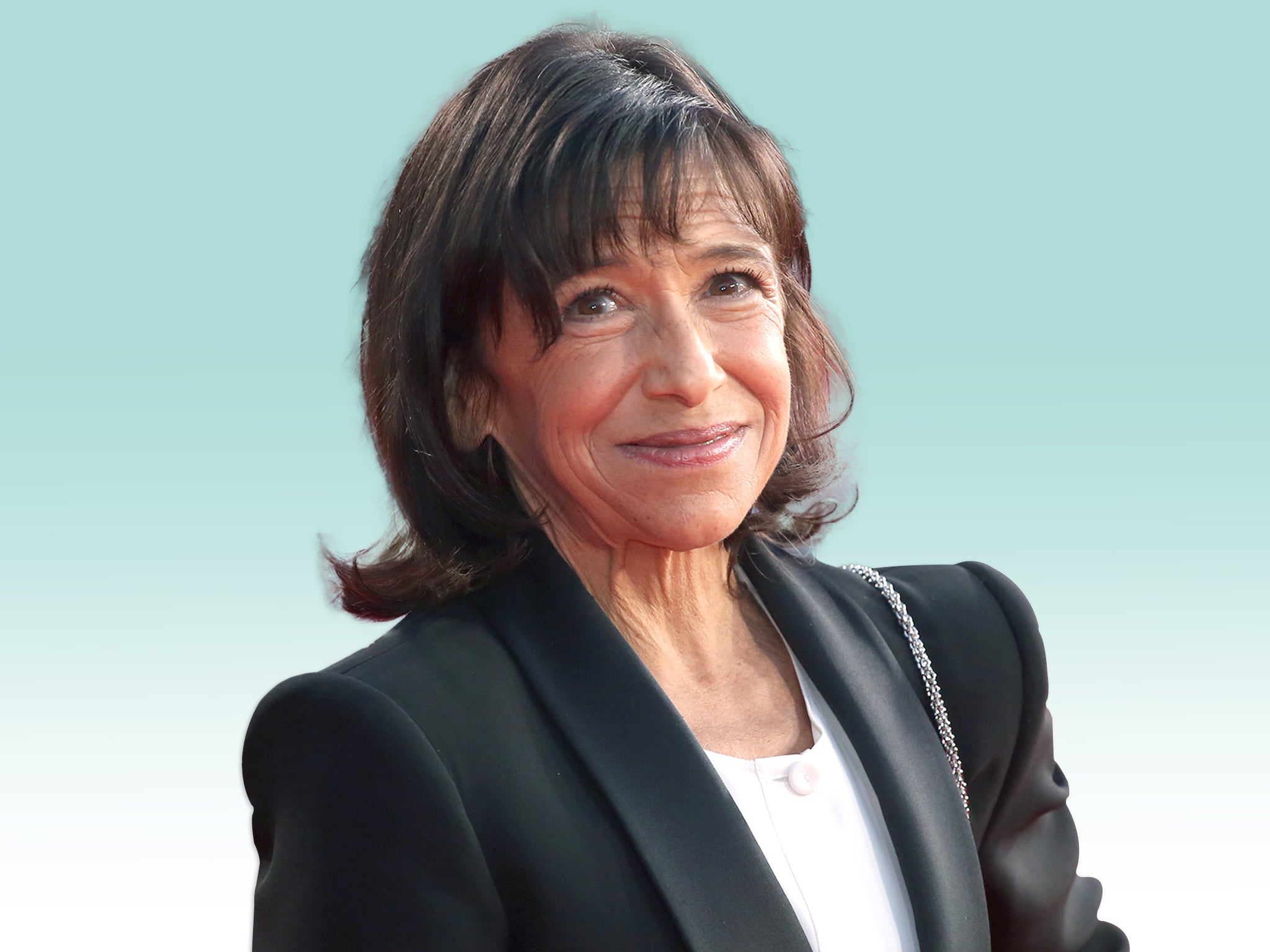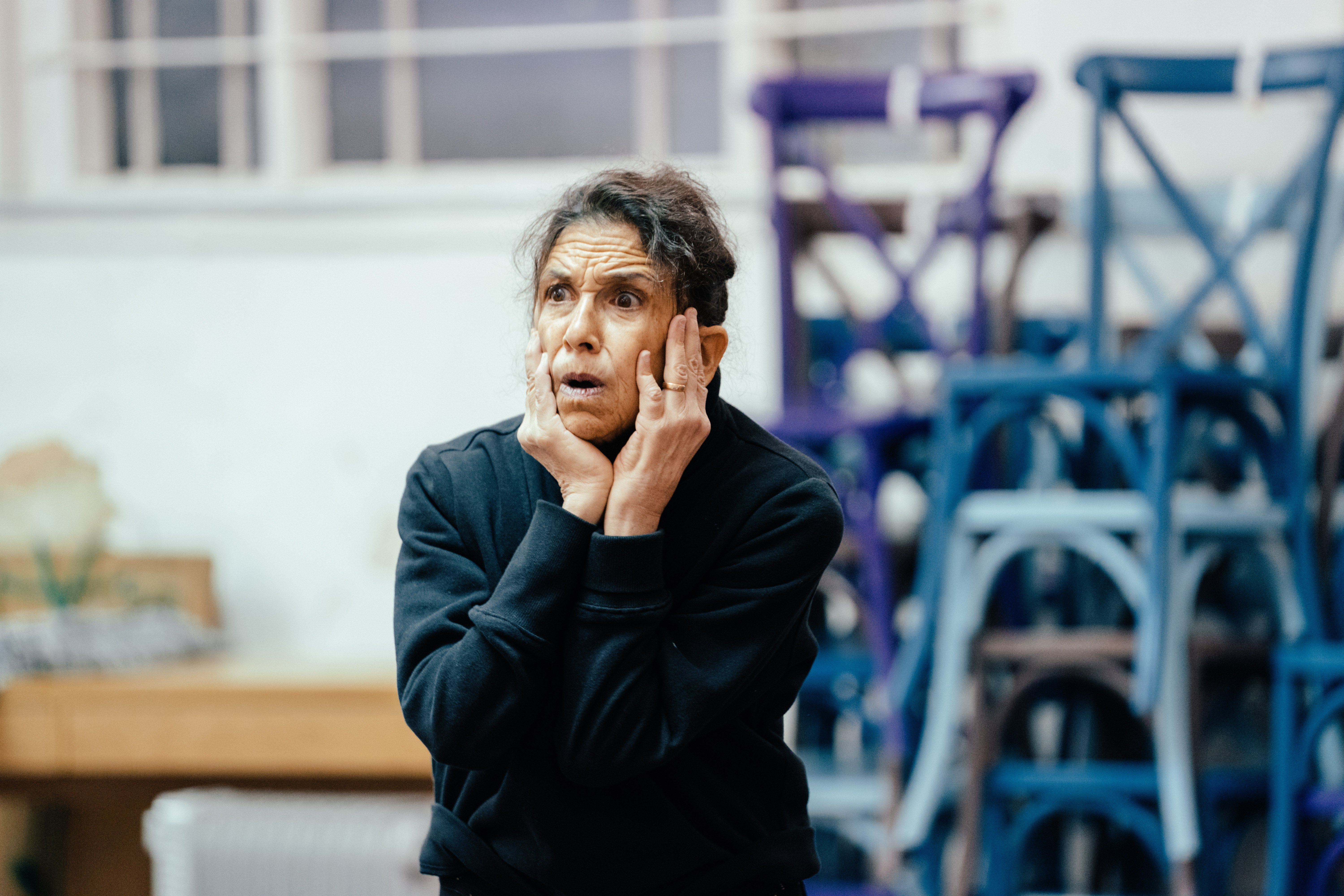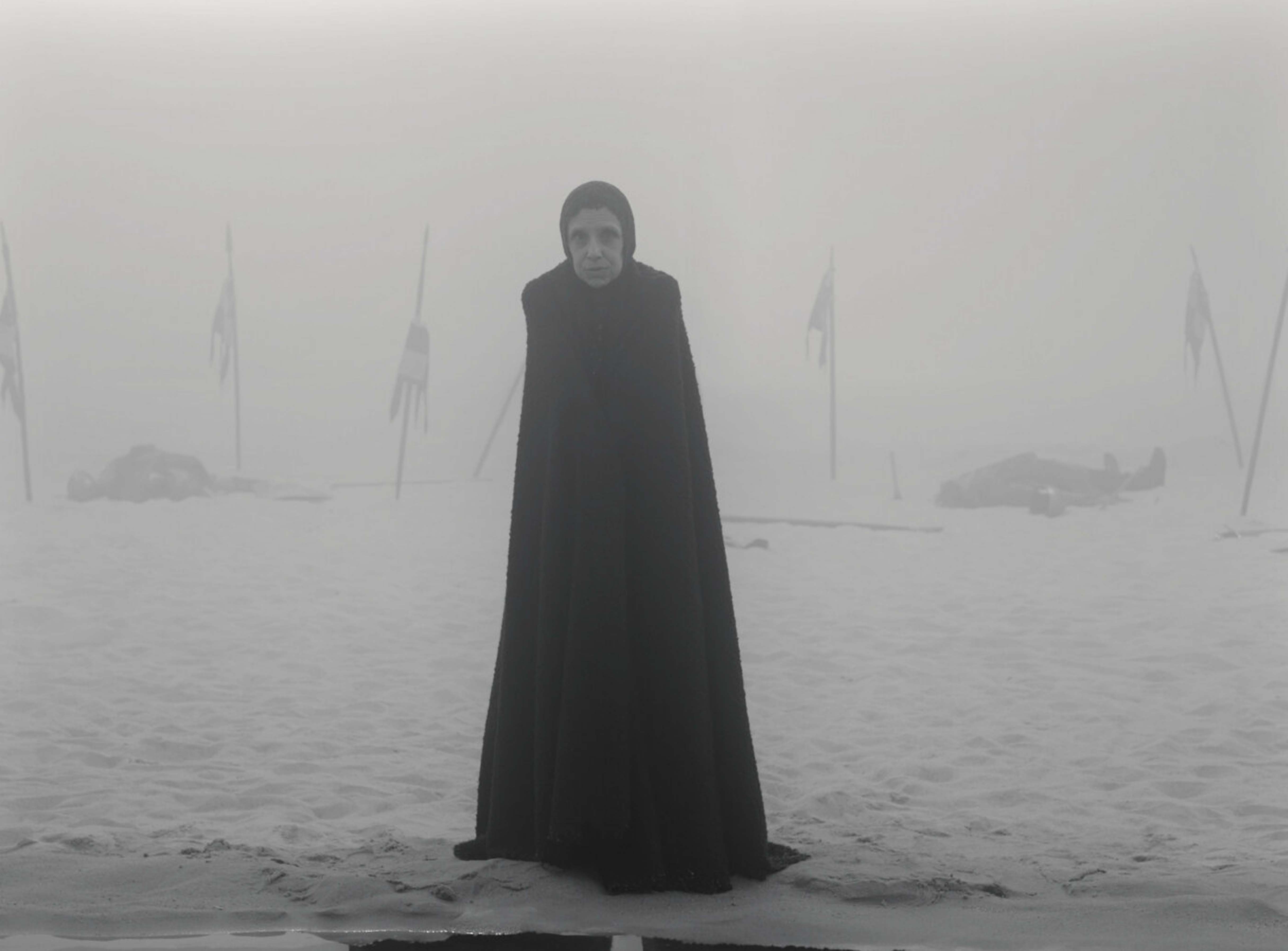The Tragedy of Macbeth’s Kathryn Hunter: ‘The car crash wasn’t an accident – it was a suicide attempt’
The award-winning stage actor gives one of the standout performances in Joel Coen’s film and is about to star on the London stage in ‘The Chairs’. But things might have turned out very differently, she tells Sarah Crompton, as she urges, ‘If you are feeling suicidal, get help, get help, get help’

Kathryn Hunter is riding high. She’s just played all three witches in a scene-stealing performance in Joel Coen’s bravura film of Macbeth, which is being talked up for major awards. A genuine theatrical star has suddenly made an impact on the big screen and is finding a wider audience – to her obvious pleasure. “I’d love to do more film,” she says, with a huge smile. “It’s like going to a new country. You get all the Alice in Wonderland excitement of that.”
In the meantime, however, the 64-year-old is busy with her first love: the stage. As a result, we’re sitting in an untidy meeting room in the upstairs office of London’s Almeida Theatre, where she is rehearsing opposite her husband Marcello Magni in a new version of Ionesco’s absurdist drama The Chairs. It’s familiar territory for her – a place where her remarkable shape-shifting qualities, her ability to become somebody quite different in front of your eyes, will find full scope.
This is how it has been with Hunter’s career from the beginning, when a terrible car accident while she was a student at Rada left her with a broken back, pelvis and arm, a smashed elbow, a crushed foot and a collapsed lung. She was told she would never walk again and was left with a crooked back, a bent elbow and a permanent limp. But the horror of the crash became a defining moment.
Returning to college, where she was studying alongside Kenneth Branagh and the late John Sessions, she learnt how to use different parts of her body and make them speak. She extended her range with the movement-based theatre company Complicité, which pushed her to her physical limits and turned her into a chameleon-like performer of the sort rarely seen on the British stage. She has used those abilities to devastating effect in a great swathe of defining performances, including as Shakespeare’s tragic heroes Lear and Richard III. In 1991, she won a Best Actress Olivier for her performance as the malicious millionairess at the heart of Dürrenmatt’s The Visit.
But I had always wondered whether, when she woke up in her hospital bed with such life-changing injuries, she ever doubted that she could continue to act. So, sitting in the sunlit room, five minutes before our allotted time is up, I ask that question. She pauses, then speaks very quietly. “Maybe I should once and for all say it wasn’t an accident. It was a suicide attempt. I guess it’s time for me to say that. Because before it was just for my family that I didn’t. To protect them.”
She doesn’t want to discuss the circumstances, but says it was the most violent of a series of efforts to kill herself. “There were times before when I’d woken up when I wasn’t at all glad. But this time, there I was in hospital, in intensive care, surrounded with machines, and Hugh Cruttwell, the wonderful Rada principal, was there in his white suit and he looked like an angel.
“And I think I just said, ‘Can I come back Hugh?’ And he said, ‘Of course, of course.’ I don’t know why but I did think I could go back to Rada, though I thought I’d end up doing radio drama to be honest.”
After that, although she continued to suffer from depression, Hunter never attempted suicide again. She is speaking about it now because she wants to take the stigma away. “It was just time to come clean,” she says, thoughtfully. “I think the really important thing I feel now is that if you are feeling suicidal, go to talk to someone, get help, get help, get help. Mental health still needs more support.”
Two things eventually pulled her through. One was her twin sister, Angela (she also has two brothers), who now runs her own foundation for women in Mozambique (“She does what I call the real work”). She came to see her every day, bringing juice and music, chivvying her along. “She actually saved me.”

But theatre played its part, too. “Finding theatre was a lifeline,” she says, smiling gently. “On a personal level, I was troubled way back at university and that’s when I got into theatre. And then trouble, trouble, trouble, and then finding theatre again. It is a lifeline because of the community of it, the imagining, and then all those things that are bubbling around inside you in terms of why we’re here and what the world is, and all that. If you don’t have a channel in which to express it, you’re just like a crazed atom going round the universe. If there’s a stage and other people and lines that brilliant other people have written, you can channel a lot of those unsorted feelings and thoughts.”
We talk about the effect of Covid on theatre. She confides, as she often does, warmly pulling you into her thoughts. “I don’t know about you, Sarah, but when we went into lockdown there was a big question mark over theatre, wasn’t there? It put maybe a not un-useful question over what we do.
“But then Marcello and I were in France doing a Peter Brook piece in one of those breaks in lockdown, and the audience all rolled up in their masks, and stayed in the bar afterwards. It was very moving to feel [the idea of theatre] had been tested. And yes, people were coming back. It’s the community thing again, a very simple act of sitting together communally and hearing a story. Then of course, the story had better be good – especially now when people are taking a certain risk.”
She laughs, a throaty sound, as deep and melodious as her unmistakeable voice. Sitting here in an oversized jacket and a neat black and white dress, she seems both instantly recognisable from all the extraordinary performances she has given, and somehow different, too – softer, more approachable.
She hopes The Chairs, adapted and directed by Omar Elerian, will provide exactly that imaginative release for audiences. She and Magni, a co-founder of Complicité, with whom she has lived and often worked for 34 years, play an old woman and an old man who are setting out chairs for a huge crowd whom they’ve invited to hear a special message. There are only three actors on stage but, as she says, “It’s a cast of thousands. You have to imagine where everyone goes, and not sit someone in the wrong chair.”
When Joel called, if he’d asked me to play a bag of chips I would have said yes
She grins. “It’s fun. When I first came to theatre of the absurd at university, I wondered if it was a bit dated. But actually there’s a great beauty to it. It really is like children – the games of the imagination are totally acceptable. That’s part of its attraction.”
Experimental work is Hunter’s natural terrain as she extends the reach of what theatre and acting can do. She has performed in six productions directed by the legendary Peter Brook, and played great Shakespearean male roles, including Puck (for Julie Taymor) and Timon of Athens (played as a woman for the RSC, and in Washington in Simon Godwin’s production). She was extraordinary as a talking, vaudevillian ape in a version of Kafka’s Monkey.
But apart from a brief turn as Arabella Figg in Harry Potter and the Order of the Phoenix, cinema has not seen much of her transformational understanding of character. Macbeth, in which she plays not only the three witches but also an old man, is set to change all that. In her few brief scenes, she brings mystery and real threat to Coen’s spare take on Shakespeare. It could do for her career what Bridge of Spies did for Mark Rylance: make her into an offbeat star. “There have been all kinds of offers coming in,” she says, laughing. “So, if I am not too old or anything, I’d love to do more film.”
She’d wanted to work with Joel and Ethan Coen for years, admiring the quality of their storytelling. “It was my dream. I’d even got to that point of writing it down, like it suggests in self-help books, and then you’re supposed to look at your list and wish that it comes true. But still years passed and nothing happened. So when Joel called, if he’d asked me to play a bag of chips I would have said yes.”

Playing opposite Frances McDormand (Coen’s wife) as Lady Macbeth, and Denzel Washington as Macbeth, proved a learning curve on both sides. McDormand, in her role as producer, was always nearby, telling her not to go too big, as Hunter explains by doing a very good impersonation of her low voice saying: “Kathryn, we’re very close to you now... very, very close.”“Other actors probably know to ask or can tell where the camera is,” she says, with another smile. “But I don’t know about all that stuff.”
She has nothing but admiration for McDormand’s and Washington’s performances, their “clarity and nuance”. Yet her own experience was also valuable. “We didn’t want to do stentorian Shakespeare, but when Denzel and I were together, he’d say, ‘Give me a few tips, Kathryn,’ so I tried very lightly to point out the importance of the line endings and the metre. He didn’t want to be a slave to it, but what he has done in the end is absolutely have that pulse underneath it. For me, what he does brilliantly is find a through line of thought.”
Seven-time Oscar winner McDormand, with her well-known ambivalence about awards, asked Hunter whether she was going to like that kind of attention, which has already netted her the New York Film Critics prize for best supporting actor. She smiles very widely at the idea.
“When I got the part in Harry Potter it was wonderful for my nieces and nephews. My credibility went up. So, because I am of Greek origin [Hunter was born in New York, but grew up in the UK], I feel it would be wonderful for the Greek community. Greece is always being talked about as this poor little country because of the [economic] crisis. That sits on people, you know. I think it would be lovely.”

She does have other concerns on her mind, not least the fact that this summer, at the Globe, she returns to playing King Lear in a production directed by Helena Kaut-Howson, 25 years after their first groundbreaking collaboration caused absolute outrage at the very idea of a woman taking on the part. “A lot of my energy went into all that,” Hunter says. “Only in Japan, where they just said, ‘Oh yes, we have the onnagata, men playing women,’ was there no fuss. There I felt I could really begin to have a go at playing Lear. But that was for about two weeks. I have spent 20 years dreaming of doing it again.”
In that time, of course, attitudes have changed. She says she always wanted to take on male roles because “I just found the ingenues boring. There was no agenda of gender equality. I wasn’t as politically sassy as that. It was just that the male roles have more interesting things to do.”
Now, when gender blindness is far more common, Hunter’s pioneering efforts seem less unusual but no less exciting. “I just think the important thing is the imaginative exercise,” she says. “If you’ve got a sense of a male role or vice versa, then just go for it. I love seeing men play women. But there is a lot of catch-up to do in terms of quotas. We have to be making up for lost time.”
‘The Chairs’ runs at the Almeida Theatre until Saturday 5 March
If you are experiencing feelings of distress, or are struggling to cope, you can speak to the Samaritans, in confidence, on 116 123 (UK and ROI), email jo@samaritans.org, or visit the Samaritans website to find details of your nearest branch.
If you are based in the USA, and you or someone you know needs mental health assistance right now, call the National Suicide Prevention Helpline on 1-800-273-TALK (8255). This is a free, confidential crisis hotline that is available to everyone 24 hours a day, seven days a week.
If you are in another country, you can go to www.befrienders.org to find a helpline near you.
Join our commenting forum
Join thought-provoking conversations, follow other Independent readers and see their replies
Comments


Bookmark popover
Removed from bookmarks